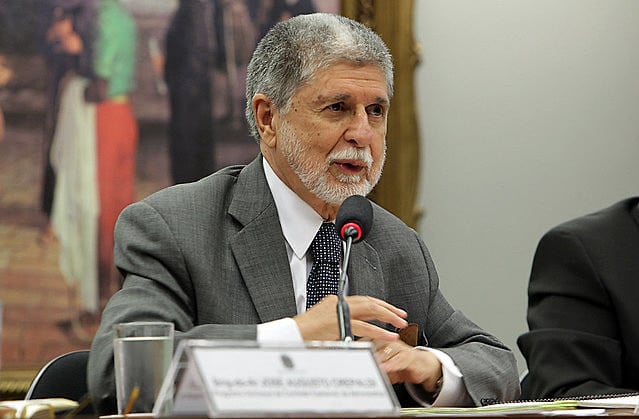In an interview with Brasil de Fato on Friday, Ju. 12, former Foreign Minister Celso Amorim said that the process of dismantling Brazilian diplomacy, which has been under way since president Jair Bolsonaro took office, was not because of lack of ability or skill, but “a political project.”
The diplomat, who was Foreign Minister during the administrations of Itamar Franco in the 1990s and Luiz Inácio Lula da Silva in the 2000s, commented on the possible appointment of Eduardo Bolsonaro as ambassador in Washington, the degradation of Brazil’s image in international forums, and the breaking of the country’s diplomatic traditions.
“Itamaraty [Brazil’s Ministry of Foreign Affairs] has always sought to be a guardian of the Brazilian traditions that are in the Constitution. The ideological question has never been raised in the foreground. Perhaps the exception was the beginning of military rule after the coup [of 1964]. But even when a dictatorial regime prevailed in Brazil, Itamaraty sought to move away from that and not to make an ideological front as they are doing now: an ideological/religious front,” he said.
In recent decades, the country has achieved international prestige with the consolidation of a non-interventionist stance and with the capacity to hold dialogues with different actors. This reputation has given Brazil a prominent place among developing countries, and the ability to influence decisions around the world.
However, recent deliberations, including vetoing any reference to the term “gender” in UN resolutions, have perplexed several foreign delegations, undermining the country’s credibility.
“Western, European countries are shocked by the votes that Brazil has made on gender issues, issues of women’s reproductive health. In all these issues, the country has gone down a path that makes Brazil seem like a medieval theocracy,” Amorim continued.
According to the former FM, the Itamaraty Ministry of Foreign Affairs seems “a ship without direction.” “Or rather, on the wrong track, on the brink of shipwreck, with diplomats as passengers on a ship that is sinking, looking for a lifeboat. And they will rarely find one. I feel very sad for my colleagues. Many must be working in a very contradictory way, even avoiding to stay in very important places, so as not to have to associate [with the Bolsonaro government]. And that will only get worse,” he lamented.
Royal wedding
Brazil was again mocked internationally on Thursday, when Jair Bolsonaro announced that he intends to nominate his son, federal deputy Eduardo Bolsonaro, to the post of ambassador to the United States.
The congressman, who has no diplomatic experience, turned 35 years old – minimum age to take the job – last Wednesday, a day before his father’s announcement. The post has been idle since April, when diplomat Sérgio Amaral was dismissed.
“I will not go into detail of nepotism, because legal advice from the Congress itself must look into [the issue]. [But the statement] is serious anyway. It totally escapes civilized standards nowadays,” says Amorim.
After Bolsonaro said that he intends to name Eduardo, US President Donald Trump has stated that he may also nominate his son Eric as ambassador to Brazil.
For Amorim, “if this happens, it will seem like a 17th-century dynasty, where military alliances were made on the basis of marriages, at the time of the absolute power of monarchies," he argues. “This is a practice that nobody follows, not even absolute monarchies.”
The statement, according to the diplomat, will further weaken the Ministry of Foreign Affairs. “There is the weakening of Itamaraty as an institution, which has many competent diplomats. And there is the fear of forming an extreme right-wing axis with sectors of the US government. Neither does the US government as a whole have that vision. And Trump has a very pragmatic stance. One should not think that by an ideological alliance he will stop defending American interests,” Amorim says.
For him, the latest events do not represent a lack of political skill, but rather “a project.” “President Bolsonaro himself, not referring specifically to Itamaraty, but to foreign policy – thus indirectly to Itamaraty – said that the objective is to destroy it,” he points out.
Flipping burgers
Although he has no experience in diplomatic posts, Eduardo claimed that he is qualified to serve as ambassador. “I studied abroad on a student exchange programme, I flipped burgers in the United States, in the cold of Maine, a state that borders Canada. In the cold of Colorado, on a mountain, I improved my English,” he insisted.
If Eduardo really is nominated ambassador, his name will be reviewed by the Brazilian Senate Foreign Relations Committee, which is responsible for appointing a rapporteur to look into the qualifications of the nominee. The name is then put to a vote in committee, and then by secret ballot on the floor.
To be ambassador to the US in Washington D.C., Eduardo should resign as deputy. A bill proposed by a fellow congressman, captain Augusto Rosa, however, aims to ensure that members of parliament can maintain elective office even after assuming diplomatic seats.
According to Opera Mundi, the decision to appoint a son to the post of ambassador to the United States has a recent precedent: in 2017, the King of Saudi Arabia chose his son Khalib bin Salman as ambassador to Washington. He left the post in 2019 after suspected involvement in the murder of journalist Jamal Khashoggi.




